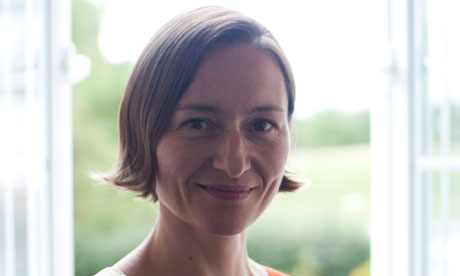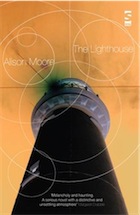Alison Moore: 'I'd like to see somebody else's angle on my book – as long as they didn't change the ending'
The author of The Lighthouse on her shock at being shortlisted for the Booker, and the prospect of her work being turned into a film

Alison Moore: 'The interest in me is overwhelming.'
Born in Manchester in 1971, Alison Moore is the author of the Man Booker prize-shortlisted The Lighthouse, the unsettling tale of a middle-aged man who embarks on a contemplative German walking holiday after the break-up of his marriage – only to find himself more alienated than ever.
How has life changed since the Booker shortlisting?
 I was shocked enough when my publishers told me that they'd entered the book, let alone for it to get this far. It's become quite surreal. Somebody said that were it not for the Booker prize not many people would know about my novel, and that's not mean, it's quite true. But it's the interest in me that is so overwhelming. There are even negotiations for film rights now. I'd be fascinated to see somebody else's angle on it – as long as they didn't change the ending too much... and I'd love [Breaking Bad's] Bryan Cranston to play ...[the main character] Futh.
I was shocked enough when my publishers told me that they'd entered the book, let alone for it to get this far. It's become quite surreal. Somebody said that were it not for the Booker prize not many people would know about my novel, and that's not mean, it's quite true. But it's the interest in me that is so overwhelming. There are even negotiations for film rights now. I'd be fascinated to see somebody else's angle on it – as long as they didn't change the ending too much... and I'd love [Breaking Bad's] Bryan Cranston to play ...[the main character] Futh.
Many people have observed of your book that it's a simple tale but difficult to explain.
I totally get that. I can give people a synopsis of a man separated from his wife who goes on a walking holiday, but it doesn't necessarily give them the feel or the punch of the novel. And that's how I write, actually; the first draft is ploughing through the story from beginning to end, and the redrafts start layering in the underbelly, its hints and echoes. Some of the difficulty for reviewers has also come from them not wanting to give away the ending, which has been very much appreciated.
Where did Futh come from? He invites sympathy but sometimes he's so unworldly, you want to shake him?
I know! I guess in one sense he's calcified in childhood and he's failed to mature. He's not quite pinned down in either time or place – or connected to the world or home via a mobile phone – which adds to the idea of him coming adrift. I wanted to combine that with a sense of anxiety in social situations. For that part of him, it was about picking out the excruciating, bumbling bits of my own character, I suppose, and magnifying them.
What's the last great book you read?
Not an obvious choice, maybe, but it's Lionel Shriver's So Much For That. She's such a generous and brave writer and the ending was just heavenly. It's very easy to hide behind your writing, and Shriver never does that.
Have you read some of the other books on the Booker list?
I have, yes. It's funny – it's been like a research project. Deborah Levy's Swimming Home gave me a very vivid dream afterwards. Will Self's book [Umbrella] is amazing – it's like a different creature altogether – and I'm reading Jeet Thayil's Narcopolis at the moment. There's a wonderful range of books and styles.
How has life changed since the Booker shortlisting?
 I was shocked enough when my publishers told me that they'd entered the book, let alone for it to get this far. It's become quite surreal. Somebody said that were it not for the Booker prize not many people would know about my novel, and that's not mean, it's quite true. But it's the interest in me that is so overwhelming. There are even negotiations for film rights now. I'd be fascinated to see somebody else's angle on it – as long as they didn't change the ending too much... and I'd love [Breaking Bad's] Bryan Cranston to play ...[the main character] Futh.
I was shocked enough when my publishers told me that they'd entered the book, let alone for it to get this far. It's become quite surreal. Somebody said that were it not for the Booker prize not many people would know about my novel, and that's not mean, it's quite true. But it's the interest in me that is so overwhelming. There are even negotiations for film rights now. I'd be fascinated to see somebody else's angle on it – as long as they didn't change the ending too much... and I'd love [Breaking Bad's] Bryan Cranston to play ...[the main character] Futh.Many people have observed of your book that it's a simple tale but difficult to explain.
I totally get that. I can give people a synopsis of a man separated from his wife who goes on a walking holiday, but it doesn't necessarily give them the feel or the punch of the novel. And that's how I write, actually; the first draft is ploughing through the story from beginning to end, and the redrafts start layering in the underbelly, its hints and echoes. Some of the difficulty for reviewers has also come from them not wanting to give away the ending, which has been very much appreciated.
Where did Futh come from? He invites sympathy but sometimes he's so unworldly, you want to shake him?
I know! I guess in one sense he's calcified in childhood and he's failed to mature. He's not quite pinned down in either time or place – or connected to the world or home via a mobile phone – which adds to the idea of him coming adrift. I wanted to combine that with a sense of anxiety in social situations. For that part of him, it was about picking out the excruciating, bumbling bits of my own character, I suppose, and magnifying them.
What's the last great book you read?
Not an obvious choice, maybe, but it's Lionel Shriver's So Much For That. She's such a generous and brave writer and the ending was just heavenly. It's very easy to hide behind your writing, and Shriver never does that.
Have you read some of the other books on the Booker list?
I have, yes. It's funny – it's been like a research project. Deborah Levy's Swimming Home gave me a very vivid dream afterwards. Will Self's book [Umbrella] is amazing – it's like a different creature altogether – and I'm reading Jeet Thayil's Narcopolis at the moment. There's a wonderful range of books and styles.
No comments:
Post a Comment